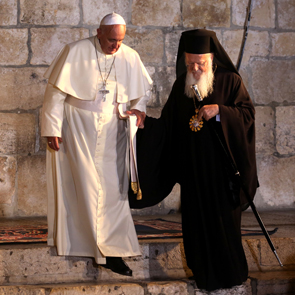Faith groups, voluntary and local authority leaders in Birmingham are negotiating a pioneering “social action covenant” to remove mistrust and promote collaboration across a range of projects.
The Archbishop of Birmingham, Bernard Longley, speaking at a charity leaders’ lunch in the city, said the covenant was currently being considered by the Birmingham Faith Leaders Group and is due to launch in the autumn.
It would be the first of its kind in the country and is likely to be emulated elsewhere.
The faith groups would commit themselves not to proselytise, while the secular organisations would commit to involving faith organisations on an equal basis.
The social action covenant is based on a template drawn up by the All Party Parliamentary Group on Faith and Society. Birmingham is a national leader in interfaith relations. The Church of England’s Church Urban Fund programme, Near Neighbours, is among those working in this area.
Archbishop Longley said the covenant fulfilled the “Big Society” ideals of the Conservative Party explaining that “the state can only do so much.”
He said: “The covenant would be a joint commitment between our faith communities and the local authority to a set of principles that would guide our engagement together, aiming to remove some of the mistrust that can exist and promoting open, practical working on all levels”.
The Birmingham Faith Leaders Group, founded after 9/11, brings together leaders from the Christian, Muslim, Jewish, Buddhist, Hindu and Sikh faiths.
Caritas Social Action Network, or CSAN, is the umbrella body of the network of Catholic agencies, many of which are involved in direct delivery of social care. These agencies meet regularly and feed their experiences on the ground into lobbying carried out by the Church.
Significantly, Birmingham City Council is backing the scheme. Cllr James McKay, Cabinet Member for Social Cohesion, Equalities and Community Safety, said: “The council is working with a range of faith groups across the city to develop a covenant, with a view to launching it later this year.”
Archbishop Longley said that recent research shows that there are more than 600 individual Catholic projects in his Archdiocese “working to relieve poverty in its broadest sense and building better and stronger communities”. These projects are run by 3,000 volunteers and more than 300 paid staff. They often work with other Christian denominations, faith communities and voluntary agencies.
The archbishop explained that in the covenant, the local authority would be asked to commit itself to welcome the involvement of faith communities in the delivery of services and social action “on an equal basis with other groups”. The faith-based organisations in their turn would be asked to commit themselves to work actively with the local authority in the design and delivery of services to the public. “We still have some way to go before this is launched but we hope to agree the covenant this autumn,” he said.
Besides a lack of basic material needs, he said, poverty includes isolation, loneliness, fear in one’s environment, being deprived of opportunities and lacking a voice.
“Some would maintain that it is not healthy for the State to try to do too much. Hence the Big Society plan of the Conservative Party to encourage communities to come together to address their problems locally. The Church supports that concept and has, even before the Big Society, been encouraging this collaborative approach,” the archbishop said.
He was invited to address the Association of Chief Executives of Voluntary Organisations by its chief executive, Sir Stephen Bubb, who he was at university with in Oxford in the mid-1970s.


 Loading ...
Loading ...